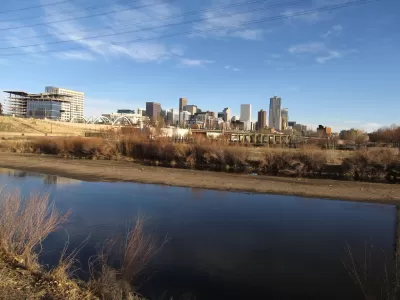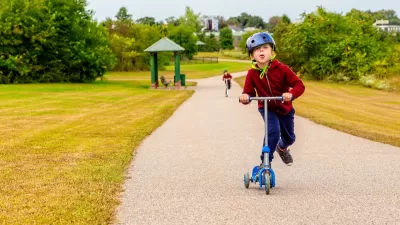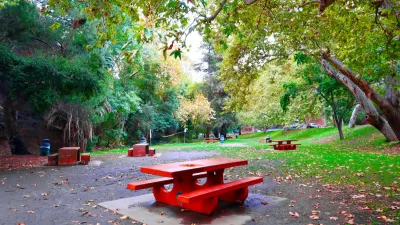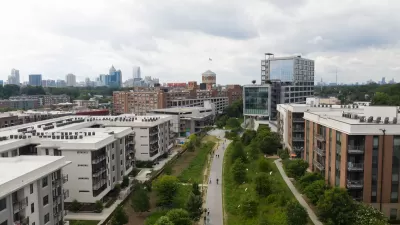After a 14-year battle to bring the project to life, the Platte Farm Open Space brings much-needed green space to a north Denver neighborhood.

"This past summer, the Center for American Progress and the Hispanic Access Foundation released a report finding that communities of color experience 'nature deprivation' at three times the rate of white Americans," writes Ambika Chawla. "According to the report, 74% of communities of color live in nature-deprived areas, with Black communities experiencing the highest levels of deprivation." A 2019 study from the University of British Columbia that analyzed ten U.S. cities concluded that "the widespread green inequities uncovered by this research are serious issues in the context of the effects of urban vegetation on urban health and well-being." Urban residents with less access to green space "are also those who are most likely to experience poor public health outcomes that could potentially be mitigated by adequate exposure to urban vegetation."
In Denver, the Platte Farm Open Space provides an example of a successful community-led project that transformed a former brownfield site in a working-class neighborhood into a vibrant community amenity. "Through a process of remediation, contaminated land was replaced with fresh layers of topsoil, and is now home to prairie habitat that attracts foxes, rabbits, birds and butterflies." The project was "a collaborative effort between the community members of Globeville, the city of Denver, and Groundwork Denver, a nonprofit organization that works to create green spaces to help improve community health."
While several factors—including the city of Denver's recent commitment to create an open space within a 10-minute walk of all residents—came together over close to a decade and a half to make Platte Farm a reality, urban park advocates know they face a long uphill battle to achieving park equity in Denver and elsewhere. "Limited financial resources for environmental justice organizations, green gentrification, and redlining are among the many obstacles that have resulted in inequitable access to green space, worsening health disparities among urban communities."
Research increasingly shows that access to parks and urban vegetation have positive effects on physical and mental health. "Benefits may include improved cognitive development and functioning, reduced symptom severity of attention deficit hyperactivity disorder, reduced obesity, and positive impacts on mental health." Many of these are related to the opportunity for higher rates of physical activity in neighborhoods with more access to green spaces, signaling that park access, more than a pleasant amenity, is an essential component of healthy neighborhoods.
FULL STORY: Denver Shows What It Takes to Level the Park-Access Playing Field

Alabama: Trump Terminates Settlements for Black Communities Harmed By Raw Sewage
Trump deemed the landmark civil rights agreement “illegal DEI and environmental justice policy.”

Planetizen Federal Action Tracker
A weekly monitor of how Trump’s orders and actions are impacting planners and planning in America.

How Atlanta Built 7,000 Housing Units in 3 Years
The city’s comprehensive, neighborhood-focused housing strategy focuses on identifying properties and land that can be repurposed for housing and encouraging development in underserved neighborhoods.

In Both Crashes and Crime, Public Transportation is Far Safer than Driving
Contrary to popular assumptions, public transportation has far lower crash and crime rates than automobile travel. For safer communities, improve and encourage transit travel.

Report: Zoning Reforms Should Complement Nashville’s Ambitious Transit Plan
Without reform, restrictive zoning codes will limit the impact of the city’s planned transit expansion and could exclude some of the residents who depend on transit the most.

Judge Orders Release of Frozen IRA, IIJA Funding
The decision is a victory for environmental groups who charged that freezing funds for critical infrastructure and disaster response programs caused “real and irreparable harm” to communities.
Urban Design for Planners 1: Software Tools
This six-course series explores essential urban design concepts using open source software and equips planners with the tools they need to participate fully in the urban design process.
Planning for Universal Design
Learn the tools for implementing Universal Design in planning regulations.
Jessamine County Fiscal Court
Caltrans
Institute for Housing and Urban Development Studies (IHS)
City of Grandview
Harvard GSD Executive Education
Toledo-Lucas County Plan Commissions
Salt Lake City
NYU Wagner Graduate School of Public Service





























